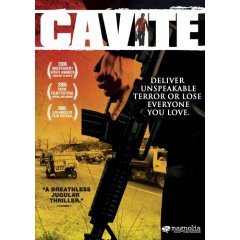
Film Festivals Are Just So Analog
With all that annoying Sundance mania finally over with for the year, it seems like a good time to provide some healthy perspective on the relevance (or irrelevance, more appropriately) of film festivals. Because make no mistake, there's a rapidly growing consensus among many filmmakers that festivals have outlived their usefulness.
Originally, events like Sundance and the Toronto International Film Festival provided the only route for independent movies to find an audience. Festivals offered the sole venue where a movie made outside the Hollywood system could generate some press and find a distributor, which was in turn the only means to finding a market and making back some money. There was just no other way that a little movie from Arkansas made by an unknown actor who looked like a cancer-stricken muppet would see the light of day. Ah, but how things have changed in the decade since "Sling Blade" premiered at Sundance.
Based on the incredible proliferation of these events, one might assume that film festivals are more relevant than ever--there are literally thousands of film festivals across the world, some specializing in specific genres and others simply claiming to be the next Cannes or Toronto or Berlin or Rotterdam or Sundance or Slamdance or...you get the idea. The advent of the digital "movie camera" has generated a glut of new films looking for audiences, and greedy opportunists abhor a vacuum: the new film festivals bred like rabbits to satisfy the need, collectively raking in millions of dollars in entry fees from struggling artists in the process. Yes, many of these film festivals are legitimate--they take your hard-earned money with the best of intentions (while offering you nothing in return if they decide your self-financed film isn't "good enough" after watching it for all of 30-seconds). But lots are licences for a few folks to make money by capitalizing on artists' hard work and dreams. And keep in mind that most of the movies that screen at the top festivals still don't even find distribution, as they viciously compete for the all-important buzz.
Still, the problem with even the most reputable festivals is compounded by the fact that so many films accepted for screening find their way there through clubby connections--usually Hollywood clubby connections--resulting in programmes that don't really offer the audiences that "something different," the exotic "I-can't-believe-I-just-got-to-see-that" type of film, the kind of film Hollywood would never make. The line between the "indie" movie and the studio film has become very blurry indeed; so much so that the term "indie" itself is widely regarded as almost meaningless. Which is why many of us prefer the moniker of "DIY filmmaker" rather than "indie filmmaker." "Do It Yourself" filmmaking means just that; whereas "indie filmmaking" means Gwynneth Paltrow cut her salary because she doesn't need another mansion in Malibu.
I guess we can't really blame these festivals for being victims of their own success. The Weinsteins and other Hollywood heavyweights want that platform of a prestigious Sundance premiere, and they're gonna get it. These movies are generally good too. But hey, why see it at a festival when it's going to get released in two hundred theatres across the country six weeks from now. The most original stuff--the stuff that needs to be discovered--is not finding its way to these festivals. And don't just take my word for it. This is what Richard Corliss had to say in a recent Time Magazine article:
You don't find as much originality in Sundance films these days, and for a simple reason. In the beginning, the festival was a home for the homeless, for a rambunctious outlaw take on filmmaking. There was no need to be cautious, since indie films were rarely hits. But as Sundance became the showcase for a form of movie gaining marketplace pull, young directors naturally made films to fit the new mold.... Trying to get your intellectual fill with Sundance films is like choosing homemade popcorn over the concession-stand variety: higher quality, little nourishment.
You can also get a sense of what the grass-roots of DIY filmmakers feel about festivals like Sundance from someone like Steve Balderson ("Firecracker") on his MySpace page where he's written an article called "The Sundance Disease":
The first cases were diagnosed in Los Angeles, leading the CDC to theorize that neither Robert (Redford) nor Park City, Utah, was the source of The Disease. I interviewed a Studio Executive suffering from The Disease. Said individual stated, "You are nothing unless your film is shown at Sundance. If you aren't at Sundance, you must not be a real filmmaker." All other research indicates that most films "accepted" into Sundance have, in one way or another, been financed, produced, or planned by a company in The Industry.
What happens to the real independent film? What happens if one doesn't surrender? The same thing that happens to people in our culture that don't fit the mold! They are exiled! They are called freaks! Which reminds me of the scene in FREAKS: "One of US! One of US!"
Another filmmaker on MySpace says, These days, I would avoid film festivals like the plague. They have evolved into cash cows for the organizers, and filmmakers are getting ripped off with ridiculous entry fees.
Hey, getting a rejection hurts, and making films is largely about rejection. But it's not just fox and the grapes disparagement here. Festivals simply cannot accommodate all the films that should be seen, and as a result often end up accommodating the films they know will get stars on their red carpet which helps the fest's profile in a hotly competitive festival marketplace. Toronto wants to stay number one. And Sundance wants to be the hottest "indie" festival too. I've seen some incredible films that I know were rejected by Sundance. I also know these rejections devastated the filmmakers, as if Sundance alone can determine the filmmaker's worth. I reviewed one such film in this blog: the incredibly innovative Cavite. The directors admit in their own commentary track that the rejection from Sundance was crushing. But their movie should be seen. It's truly a piece of DIY art, and a significant account of a specific time and place. These filmmakers are important to the evolution of cinema, whether Sundance has room for them or not.
In the end, the most comelling reason why I say film festivals are "just so analog"--the reason why I believe they've served their purpose and why they'll probably become less relevant to innovative, groundbreaking cinema while continuing to offer a good party where where you can drink with Julianne Moore--is because the digital revolution (specifically online distribution and promotion) allows the DIY filmmaker to achieve the same intended results as a festival. Rather than paying money to get a few minutes of your movie screened by a selection committee, filmmakers are discovering that if their movie really is any good, they can self-distribute the film online and on DVD. A case in point: we're starting to hear a lot about a little self-financed movie called "Four Eyed Monsters", which is really getting noticed via online marketing and downloads, despite its self-admitted failure at festivals. This is what the filmmakers had to say in a recent issue of Wired Magazine: "Festivals are a dead end. We've found a different way." You can hear more from the "Four Eyed Monster" folks in a podcast from The Workbook Project.
Or read up on The Angry Filmmaker who espouses DIY distribution and eschews festivals in general.
Or check out a website like www.withoutabox.com to (1) get a sense of just how many thousands of festivals are out there, and (2) read the forums which increasingly reveal a dissatisfaction regarding what festivals can do for us as artists and filmmakers.
Yes, I'll admit, I'd like to hang out with Sarah Polley while my next movie screens at Sundance too. Who wouldn't? But the key to remember is that if my next movie doesn't make it there, I might be able to generate just as much success regardless. My career no longer depends on it. And my bet (I'm always making bets on this blog), in 5 years, festivals will not be the place where we discover the next "Sling Blade."


